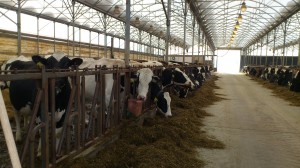Animal manure may be more than just stinky. A recent Yale study showed that cow manure fertilization induces a bloom of antibiotic-resistant bacteria in soil, a finding with important implications for agricultural practices and for public health.
According to author Nichole Broderick, Associate Research Scientist in Molecular, Cellular, and Developmental Biology, the research was motivated by interest in “the evolution of antibiotic resistance, especially given that antibiotic-resistant pathogens are major medical problems.” Livestock manure is known to be a significant reservoir of antibiotic resistant genes, even when the animals have not been treated with antibiotics. Given the common practice of using manure as fertilizer, especially among organic farmers, there is concern that manure may heighten antibiotic-resistance in soil bacteria.
To investigate, researchers treated soil with either inorganic fertilizer or manure from cows with no history of antibiotic treatment. The manure-treated soil exhibited significantly higher levels of antibiotic-resistant bacteria than the soil treated with inorganic fertilizer.
Yet the most surprising discovery was that the increase in antibiotic-resistant bacteria in manure-treated soil was not due to resistant bacteria originating in the manure itself. Instead, the manure induced a bloom of resistant species that had already been present in the soil. According to lead author Nikolina Udikovic-Kolic, a former Yale postdoctoral researcher who is now at the Ruder Boskovic Institute in Croatia, this finding “adds an important new dimension to our consideration of how antibiotic resistance emerges and potentially spreads as a consequence of agricultural practices.” Exactly how manure stimulates proliferation of antibiotic-resistant soil bacteria is unknown and represents an exciting future direction, Udikovic-Kolic said.
With regards to the implications for human health, Udikovic-Kolic explained that there are two routes by which resistance genes from manure-fertilized soil could migrate to humans: “either the bacteria that contain them cling to root crops such as carrots and then move from the produce to people, or the resistance genes are transferred to other bacteria that colonize humans.” The latter scenario of “gene hopping” is unlikely, as the antibiotic-resistant genes were not found on mobile genetic elements. However, Udikovic-Kolic noted that the possibility of antibiotic-resistant bacteria clinging to produce does exist, which is especially troubling given that some of the bacterial species enriched by manure fertilization are opportunistic human pathogens.
Yet according to Fabienne Wichmann, lead author and a former Yale postdoctoral researcher who is now at the State Laboratory of Basel in Switzerland, the solution is not to abandon manure fertilization altogether. Wichmann says that manure fertilization has benefits and is “important for nutrient cycling.”
Instead, Broderick said modifications can be made to how and when manure is used. Since the soil bacterial population can rebound to its ground state after a few months, crop planting should be delayed until three months after manure is applied, as is currently the practice in organic farming. Recent clamors among farmers for freedom to apply manure at any time may not be wise, Broderick suggested. Since the soil bacterial population can rebound to its ground state after a few months, crop planting should be delayed until a certain period of time after manure is applied. Recent clamors among organic farmers to loosen new FDA restrictions on the timing of manure treatment may not be wise, Broderick suggested. Ultimately, according to Broderick, “the biggest take-home is to be aware and consider best possible practices.”

